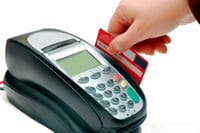 Which saves you more money: a debit card or a credit card? Most people believe debit cards are cheaper because there’s no interest rate or annual fee. But what about overdraft fees?
Which saves you more money: a debit card or a credit card? Most people believe debit cards are cheaper because there’s no interest rate or annual fee. But what about overdraft fees?
Debit card overdrafts are now the biggest source of revenue for banks. The danger with debit cards is twofold: One, the transactions hit your account instantly and two, very few people keep track of their debit card transactions in a check register.
Debit cards are convenient and fast. We use them for everything from buying $200 worth of groceries to $1.50 take-out coffee. The problem is that we aren’t notified at check-out if our account is overdrawn like we would be if we had maxed out a credit card. And overdraft fees are expensive – approximately $30 per transaction. Some people have found themselves with $60 – $1,00 in overdraft fees in a single day because they continued to use their debit card while their account was overdrawn.
Please, take a moment to record your debit card purchases. Remember, too, that debit cards hit your account instantly but deposits don’t. If you deposit a check and use your debit card on the same day, the debit card transactions will hit your account before your deposit clears.
